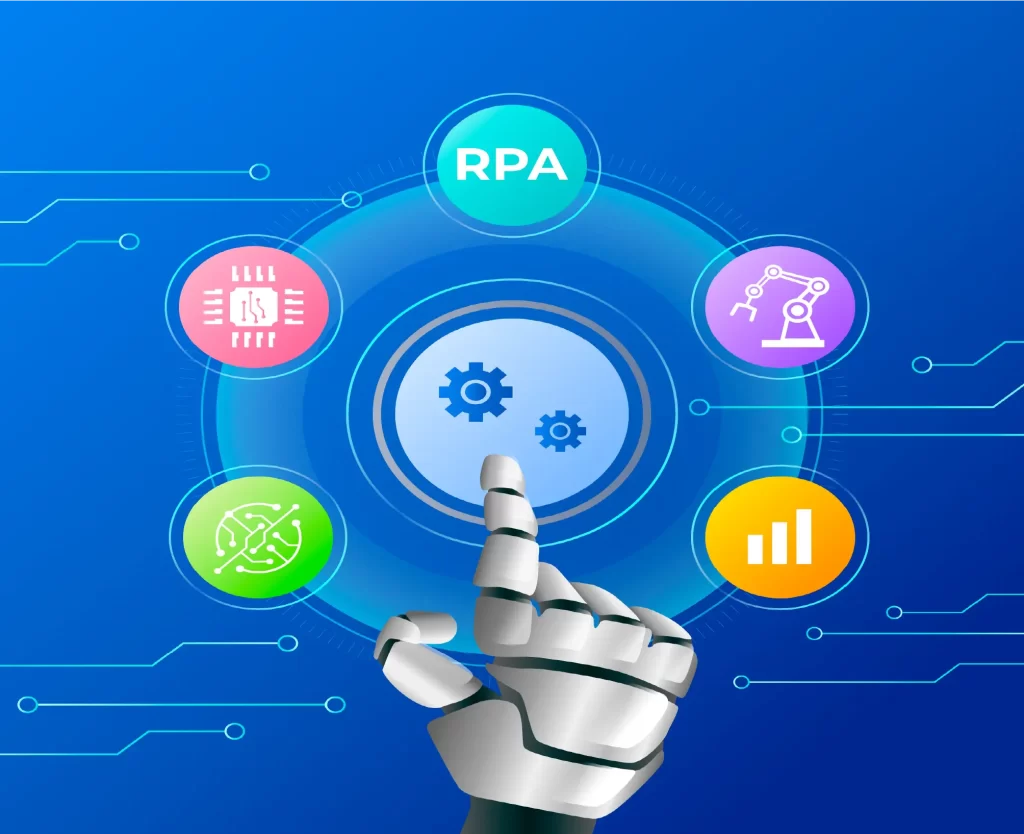
Advancing technology and automation have allowed CPA firms to find innovative approaches to streamline client business activities. Imagine an automated world where CPA firms can handle client operations without human involvement, minimizing time and boosting accuracy. This is not a dream; it is now a reality. Using technologies that limit intricacy and promote efficiency is vital for remaining competitive in an industry environment that continues to evolve.
Embracing automation fosters productivity and empowers CPA firms to provide their clients with better services. However, what advantages can automation give CPA firms, and how can it impact day-to-day procedures?
This article will examine the implementation of automation by CPA firms to attain outstanding operational performance and optimise client tasks.

The term “automation” emphasizes the use of software and technology to execute time-consuming, repetitive procedures that tax specialists and accountants previously performed. Automation has become important for CPA (Certified Public Accountant) organizations to remain competitive in today’s fast-paced world.
The following are some of the main arguments in support of automation adoption by CPA firms:
Increased Production and Efficiency: Accounting professionals may improve productivity and efficiency by automating repetitive tasks like data entry, handling invoices, and creating reports. This ensures accuracy, reduces the possibility of human error, and accelerates the procedure.
Compliance and Accuracy: Automated software ensures that financial reports and statements are error-free and fully per the law. It also assists in keeping up with the latest regulatory standards.
Better Client Service and Satisfaction: Increased effectiveness in carrying out tasks like accounting report creation and filing taxes leads to quicker response times and increases customer satisfaction.
Cost Savings: Automation can assist in lowering expenditures on operations and embracing a more sustainable strategy by eliminating the need for paper-based processes.
Data Security and Risk Management: Advanced automation systems safeguard confidential financial data and maintain its security by providing access controls, encryption, and secure data storage.
A thorough approach is necessary for the successful use of automation in a CPA firm. This involves assessing existing processes, identifying areas for improvement, identifying the appropriate tools, and making sure individuals receive adequate instruction to utilize them.
Here are some recommended practices to consider to help CPA firms optimize the benefits of automation:
Commence Small: Automate simple repetitive processes initially, then work gradually to more sophisticated ones. This safeguards members from becoming overwhelmed by too many changes at once and encourages them to quickly adjust to new practices.
Buy the Correct Software: As soon as the repetitive tasks have been identified, you must invest in suitable automation software. Seek accounting software with integrated automation functions or similar software that fulfils the unique requirements of CPA firms. Scalability and accessibility are two additional benefits that cloud-based systems might offer, allowing easy team collaboration.
Include Stakeholders: All relevant stakeholders, such as collaborators, staff, and clients, must be part of the decision-making process concerning automation because it influences the entire organization. Understanding their requirements ensures that the tools for automation used coincide with the organization’s primary goals.
Customization and Integration: Search for options for automation that can be tailored to the specific demands of the firm in question. Furthermore, for data to move efficiently throughout the firm and for silos to be eliminated, interaction with current software systems is necessary.
Improve Continuously: Automation is a process that requires frequent attention and examination. To keep ahead of industry developments and fulfil client demands, companies should constantly evaluate their tools as new technologies become available.
Learn more about how you can automate your accounting practice.
Listed below is a comprehensive approach to assist CPA firms in effectively implementing automation:
Finding the key processes that require automation is the first step towards integrating them. This could involve regular duties like data entry, processing invoices, preparing reports, or managing compliance-related activities. Firms can see rapid increases in efficiency by focusing on these domains first.
Consider automation software that satisfies the unique requirements of the organization. Take into consideration each tool’s accessibility, scalability, and effectiveness. Leading options such as QuickBooks and Xero are recognized for their wide array of functions that address a range of firm requirements, such as report generation, managing payroll, and keeping track of transactions.
Considering the possible impact of automation should be done after the correct tools have been identified and assessed. Also, design a clear automation plan that addresses each stage of the implementation process. To monitor progress, clearly define targets and standards. By assessing the impact, CPA firms may make more correct decisions about which processes to automate.
Provide comprehensive practical training sessions for employees on the basics of operation and how to use the new tools. Include IT support to ensure that any technical challenges are addressed.
CPA firms should concentrate on broadening automation efforts across the organization while regularly streamlining processes after the initial implementation. This might involve expanding automation to new tasks, optimizing existing automation systems, and leveraging analytics and data to further improve effectiveness and efficiency. Furthermore, as the organization grows and advances, update the automation configurations following the latest accounting standards and guidelines.
CPA firms may successfully implement automation to optimize their workflow while offering enhanced value to their clients by adhering to these steps. Click here for additional details.
Automation and outsourcing have emerged as popular approaches used by CPA firms to enhance their productivity. Collaborating with accounting professionals like Accounting Farm can help CPA firms function even more effectively, especially when automation is implemented.
Organizations can access skilled professionals who specialize in automated accounting through outsourcing, which allows them to deal with intricate tasks without burdening their staff. The potential to access particular expertise is one of the primary advantages of working with outsourced accountants for automation.
Accounting firms that outsource frequently have deep expertise in automation tools including robotic process automation (RPA), deep learning algorithms, and cloud-based accounting systems. For CPA firms to succeed in the digital era, partnering with outsourced accountants to adopt automation can be an advantageous strategic decision as the accounting profession evolves.

One of the major developments in the automation processes used by CPA firms is tax automation. It might take a lot of effort and time to manually manage the regular modifications to tax legislation. Firms can easily adapt to these developments with the help of automation in tax filing and preparations.
Tax automation offers numerous benefits to CPA firms in tax preparation and filing. Here are why firms Should Use Tax Automation:
Improved Accuracy and Compliance: CPA firms can significantly reduce the possibility of errors and ensure their client’s tax responsibilities are fulfilled correctly and on time by implementing automated tax software into place. This eliminates the possibility of fines and penalties while enhancing the company’s reputation for reliability.
Enhanced Productivity: Various time-intensive tasks, including data entry, calculations, and creating reports can be completely automated. Thus, employees may concentrate their expertise on higher-value tasks like providing strategic tax advice, building client relationships, and recognizing opportunities for tax optimization.
Cost Effective: CPA firms can avoid spending an enormous amount of money on staff hours, rework, and probable fines by minimizing the need for manual intervention and minimizing the probability of errors. This enables the firm to solely focus on tasks that encourage growth and profitability and allocate resources more strategically.
CPA firms that want to improve productivity, reduce errors, and maintain compliance with the constantly evolving tax legislation must embrace tax automation. CPA firms can take full advantage of tax automation to enhance client service and optimize processes by carefully evaluating automation solutions while handling all potential risks.
Tax automation has several benefits, but there are some drawbacks as well:
Restrictions on Customization: Limited customization possibilities are an expected characteristic of tax automation applications, which can be problematic for organizations catering to specialized sectors or clients with specific needs. In such circumstances, firms can discover that the software isn’t sufficiently versatile to accommodate their unique requirements, demanding extra human input or modifications.
Supplier Lock-In: It may be challenging and costly to switch platforms once an entity has adopted a specific tax automation solution. Long-term agreements between organizations and software vendors may restrict them from looking into superior or more affordable options in the future.
Staff Adjustment: Staff members used to traditional procedures might be resistant to switching to automated processes. There could be temporary delays in productivity if some staff members find it difficult to adapt. To guarantee that every staff member can use modern technology effectively, continuous training and guidance are crucial.
Intricate Data Transfer: It can be challenging to transfer existing client data into new tax automation software, specifically for organizations with considerable amounts of data or inconsistent record-keeping processes. One of the greatest difficulties is ensuring data is transferred accurately without losing significant past data. Any corruption or destruction of data during this transition might result in operational disruptions and have an impact on compliance.

The benefits of outsourcing for automating tasks in CPA firms include:
Having Access to Specialized Knowledge: CPA firms can get specialized expertise through task outsourcing that may not be offered locally. Outside service providers, such as Accounting Farm, frequently have specialized teams with an abundance of experience and understanding primarily fields, such as accounting software, tax regulations, and compliance requirements. This knowledge can offer value to CPA firms by enabling accurate and timely completion of tasks and allowing the firms to offer their clients top-notch services.
A stronger emphasis on fundamental skills: CPA firms can focus on their key competencies and long-term objectives by automating everyday processes through outsourcing. Organizations can focus their attention on innovation, client relationships, and expanding their businesses by outsourcing time-consuming and repetitive activities to third-party vendors. Strengthening a business and becoming competitive in the market are potential rewards of this strategic approach.
Better Compliance and Risk Management: CPA firms can reduce risks and ensure compliance with industry standards by outsourcing duties associated with regulation and compliance. The probability of mistakes and non-compliance is reduced since external service providers usually have strong policies and controls that guarantee adherence to pertinent laws. For CPA firms, where compliance with standards is essential, this can be very helpful.
Outsourcing can help CPA firms streamline their operations and provide their clients with greater services in many ways, including cost-effectiveness, access to specialized skills, flexibility, and increased focus on key competencies. CPA firms can set themselves up for future success and growth in the continually evolving business environment by implementing outsourcing.
To learn more benefits of automation for CPA firms, visit this site
There are many ways that CPA firms can enhance their range of services and accelerate client interactions with automation. CPA firms can boost client communication, improve operational efficiency, and offer more value to their clients by employing cloud-based accounting software, RPA for repetitive activities, and advanced data analytics tools. To remain competitive and accommodate the changing needs of their clients, CPA firms must embrace automation as it becomes readily accessible and implement it into their firm processes.
CPA firms who want to improve their business efficiency might approach Accounting Farm for support. Accounting Farm allows CPA firms to emphasize more on high-value services like strategic planning and managing client relations by offering unique solutions for automating repetitive accounting tasks like bookkeeping duties, payroll administration, and tax compliance. Their expertise in integrating modern technology offers smooth automation, reducing errors and human effort while increasing overall output.
No, because consistency and productivity are enhanced with automated accounting processes, but human intelligence must be blended with automation.
Business owners must keep track of their financial affairs. Accounting software streamlines frequent accounting responsibilities by supporting payment monitoring, managing expenses, client invoicing, transaction reconciliation, identifying errors, and book closing.
The process of implementing software to automate accounting tasks and procedures is known as accounting automation. It is a means to ensure that each component of the organization is being paid attention to while simultaneously enhancing accuracy and efficiency.
Though technology has automated a lot of accountancy work, humans are still required for certain tasks. Reliability and efficiency in bookkeeping are increased with human intelligence.
There exist multiple workflows for the Accounting Process. This includes sales orders, purchase orders, claims, reports of events, fresh hire onboarding, etc.
Accountant efficiency and ease of use are the two main goals of accounting automation.
Automated bookkeeping is the process of utilizing technology to streamline the process of maintaining and handling financial transactions.
Excel has constraints that make it inappropriate for developing firms with increasingly intricate financial needs, even while it may be a strong tool for basic bookkeeping in very small firms.
Robotic process automation is the process of computerizing data entry duties from bills and invoices payable, expense reports, and receipts from other sources.
With the use of modern technology, accounts payable automation may help you streamline and improve every aspect of the accounts payable process. Electronic bills are the first step in the process; they can be transformed from paper to digital format, received through a portal, or directly from a supplier.
Explore the benefits of outsourcing and learn how our team can support your firm with a range of accounting services. From tax preparation and bookkeeping to financial statement audits and advisory services, we provide scalable solutions to meet your evolving needs.
Connect with us even faster by booking a meeting today at a time that works best for you.
Top Accounting Outsourcing Services For CPAs, Accounting, and Bookkeeping Firms.
Hello,
Thanks for visiting our website!
How can we help you?
Start the chat
WhatsApp us